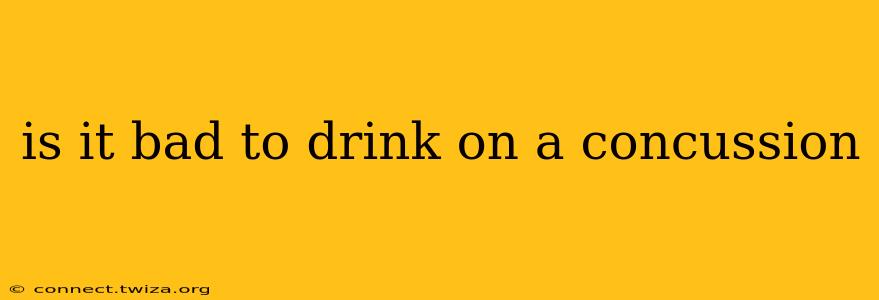Experiencing a concussion is serious, and understanding how to manage your recovery is crucial for your long-term health. One frequently asked question surrounding concussion recovery is: Is it bad to drink alcohol after a concussion? The short answer is a resounding yes. Alcohol can significantly hinder the healing process and potentially worsen the effects of a concussion.
Why Alcohol and Concussions Don't Mix
Alcohol is a central nervous system depressant. This means it slows down brain activity. After a concussion, your brain is already struggling to recover from the trauma it's endured. Adding alcohol to the mix further depresses brain function, potentially prolonging recovery time and increasing the risk of complications.
Here's a breakdown of why alcohol is detrimental after a concussion:
-
Increased Swelling and Inflammation: A concussion causes swelling and inflammation in the brain. Alcohol can exacerbate this swelling, leading to increased pressure within the skull. This added pressure can delay healing and potentially worsen symptoms.
-
Delayed Healing: Alcohol interferes with the brain's natural healing processes. It disrupts the body's ability to repair damaged cells and tissues, slowing down the recovery timeline.
-
Exacerbated Symptoms: Common concussion symptoms like headaches, dizziness, nausea, and confusion can be significantly worsened by alcohol consumption. Even small amounts can trigger or intensify these symptoms.
-
Increased Risk of Long-Term Complications: Studies suggest that alcohol consumption after a concussion may increase the risk of developing Post-Concussion Syndrome (PCS), a condition characterized by persistent symptoms that can last for weeks, months, or even years.
-
Interaction with Medications: If you are taking medication for your concussion symptoms, alcohol can interact negatively with these medications, potentially leading to adverse effects or reduced effectiveness.
How Long Should I Avoid Alcohol After a Concussion?
There's no single definitive answer to this question. The duration you should abstain from alcohol depends on the severity of your concussion and your individual recovery process. It's crucial to consult with a doctor or healthcare professional. They can assess your specific situation and provide personalized advice based on your symptoms and recovery progress. Generally, it's recommended to avoid alcohol until your symptoms have completely resolved and you've received medical clearance.
What if I only have mild symptoms?
Even with mild symptoms, alcohol can still interfere with the healing process. It's best to err on the side of caution and avoid alcohol until you're fully recovered. Mild symptoms can sometimes mask more serious underlying issues, and alcohol could obscure these issues.
Can I drink a small amount of alcohol?
No. Even small amounts of alcohol can have a negative impact on your recovery. It's best to completely abstain from alcohol until your doctor gives you the all-clear.
What are the long-term effects of alcohol consumption after a concussion?
Long-term effects can include prolonged recovery times, increased risk of post-concussion syndrome (PCS), cognitive impairments, and an elevated risk of experiencing future concussions.
Beyond Alcohol: Other Important Considerations for Concussion Recovery
Focusing on proper rest, avoiding strenuous activity, managing stress, and following your doctor's recommendations are crucial steps in concussion recovery. A balanced diet and adequate hydration also play vital roles in your body's ability to heal.
Remember, seeking medical attention after a concussion is paramount. Don't hesitate to consult with your doctor or other healthcare professionals for personalized advice and support. Your health and well-being are the top priority.
